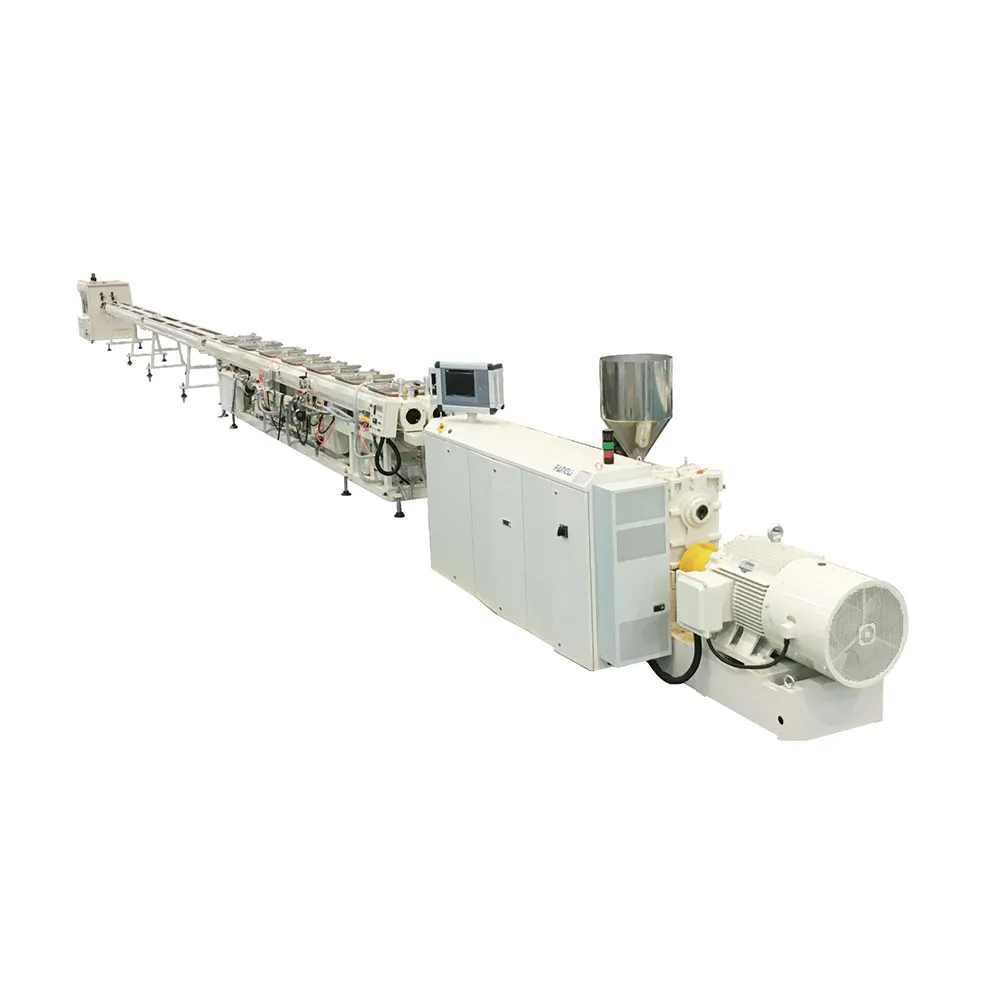Why is the Solid Wall Pipe Extrusion Line a Game Changer in the Manufacturing Industry?
2024-12-11
The solid wall pipe extrusion line is a critical piece of technology in modern manufacturing, playing a vital role in producing durable, high-quality pipes used across various industries. But what makes this extrusion line so essential, and why has it become a game changer in pipe production? Let’s explore the intricacies and benefits of this technology.
1. What is a Solid Wall Pipe Extrusion Line?
A solid wall pipe extrusion line is an advanced manufacturing system designed to produce pipes with solid walls, primarily made from plastic materials such as PVC, HDPE, or PP. This extrusion process involves feeding raw plastic material into an extruder, where it is melted and forced through a die, shaping it into a pipe. As the pipe exits the die, it is cooled and cut to the desired length.
The solid wall extrusion process is continuous, which allows for high throughput and precision in the manufacturing of pipes, making it an efficient and cost-effective solution for large-scale pipe production.
2. Why is the Extrusion Process Ideal for Pipe Production?
The extrusion process offers several advantages that make it the ideal choice for pipe manufacturing. One of the primary benefits is its ability to produce pipes with uniform thickness and consistent dimensions. The continuous nature of the process allows manufacturers to create long lengths of pipe with minimal waste, reducing costs and improving overall efficiency.
Additionally, the extrusion line can be adjusted to produce pipes of different diameters and wall thicknesses, giving manufacturers the flexibility to meet the specific needs of various industries. Whether it's water pipes, drainage systems, or cables for telecommunications, the extrusion line can be customized to create pipes for any application.
3. What Materials Are Commonly Used in Solid Wall Pipe Extrusion Lines?
Solid wall pipes are typically made from materials that offer durability, resistance to corrosion, and the ability to withstand environmental stress. The most common materials used in extrusion lines for solid wall pipes include high-density polyethylene (HDPE), polyvinyl chloride (PVC), and polypropylene (PP).
Each of these materials has its own unique set of properties. For example, HDPE is known for its strength and resistance to chemicals, making it ideal for water and gas distribution systems. PVC, on the other hand, is more affordable and is commonly used in plumbing and drainage systems.
The ability to use these diverse materials in extrusion lines gives manufacturers the ability to produce pipes suited to a wide range of applications, from residential plumbing to industrial pipelines.
4. How Does Automation Enhance the Extrusion Line’s Performance?
Modern solid wall pipe extrusion lines are often equipped with advanced automation features that help improve production efficiency and product quality. Automation systems allow for precise control over various parameters of the extrusion process, such as temperature, pressure, and extrusion speed.
These automated systems not only help maintain consistency in the final product but also reduce the likelihood of human error. By automating the process, manufacturers can also increase the throughput of the extrusion line, reducing labor costs and minimizing downtime. This makes it possible to produce large quantities of high-quality pipes in a shorter amount of time.
5. What Are the Key Benefits of Using Solid Wall Pipe Extrusion Lines?
The primary benefits of using a solid wall pipe extrusion line include efficiency, cost-effectiveness, and versatility. First, the continuous nature of extrusion allows for high-volume production, making it easier for manufacturers to meet the growing demand for pipes across industries. The ability to adjust parameters ensures that pipes can be produced to the exact specifications required, whether it's a specific size, wall thickness, or material.
Moreover, solid wall pipes produced through extrusion are known for their durability and longevity, which makes them suitable for a wide variety of applications. Whether in residential, commercial, or industrial settings, these pipes are essential for systems that require reliable, long-lasting solutions.
6. Can Solid Wall Pipe Extrusion Lines Be Customized for Specific Applications?
Yes, one of the key advantages of solid wall pipe extrusion lines is their flexibility. Manufacturers can customize the extrusion line to produce pipes with varying diameters, wall thicknesses, and material compositions. Some extrusion lines even allow for multi-layer pipe production, where different materials are combined to achieve specific properties such as enhanced strength or resistance to environmental factors.
This customization capability makes the extrusion line suitable for a variety of industries, from water and sewage systems to cable protection and agricultural applications.
7. What Role Does Quality Control Play in the Extrusion Process?
Quality control is a critical component of the solid wall pipe extrusion process. During production, pipes are continuously monitored for dimensional accuracy, surface smoothness, and material consistency. In-line measurement systems are often employed to ensure that the pipes meet the required specifications. These systems can detect any variations or defects, allowing manufacturers to make adjustments before the pipes are cut or packaged.
Ensuring high-quality standards is vital for the reliability and performance of the pipes, especially when they are used in critical infrastructure like water distribution systems or industrial pipelines.
8. How Does the Extrusion Line Contribute to Sustainability?
Sustainability is a growing concern in manufacturing, and solid wall pipe extrusion lines contribute to greener production practices in several ways. First, the extrusion process minimizes waste by using raw materials efficiently. The continuous nature of the process reduces scrap, and any leftover material can often be recycled and reintroduced into the production cycle.
Moreover, many manufacturers are opting for recyclable and environmentally friendly materials, such as PVC and HDPE, which can be repurposed after the end of their service life. The ability to recycle both raw materials and finished products helps reduce the environmental footprint of the pipe manufacturing process.
The solid wall pipe extrusion line is an essential tool in the modern manufacturing landscape. Its ability to produce high-quality, durable pipes efficiently and at scale makes it a cornerstone of industries that rely on reliable piping systems. With continued advancements in automation, material science, and sustainability, extrusion lines will remain a vital part of the production process for years to come.



